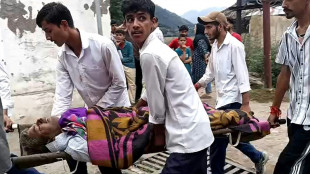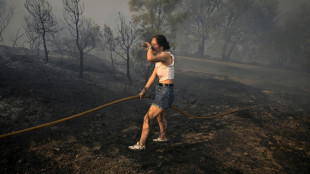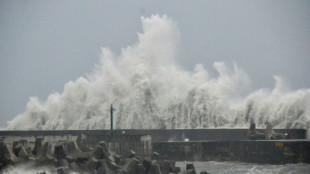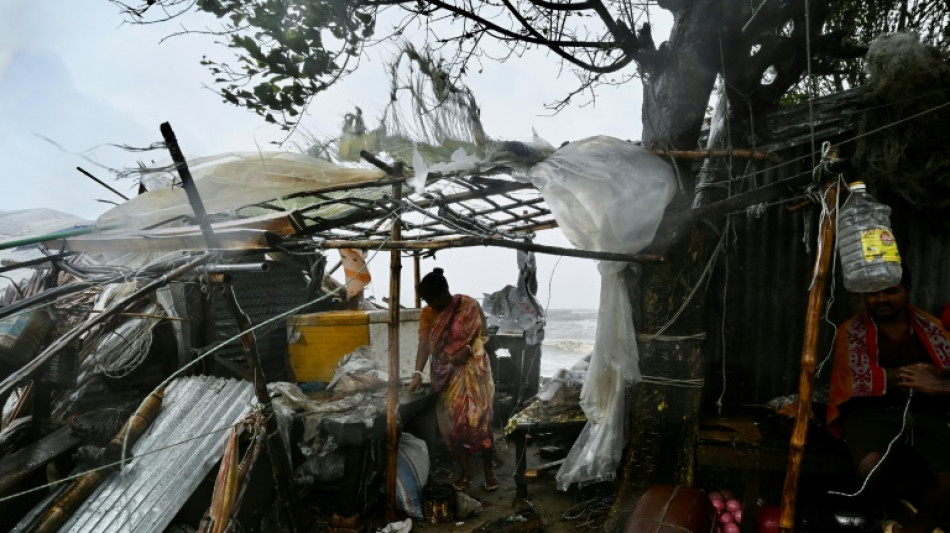
-
 Malawi's restless youth challenged to vote in September polls
Malawi's restless youth challenged to vote in September polls
-
Indonesian roof tilers flex muscles to keep local industry alive

-
 World's first humanoid robot games begin in China
World's first humanoid robot games begin in China
-
Scott Barrett returns to lead All Blacks against Argentina

-
 Five things to know about Nigeria's oil sector
Five things to know about Nigeria's oil sector
-
New compromise but still no deal at plastic pollution talks

-
 France's Cernousek seizes lead at LPGA Portland Classic
France's Cernousek seizes lead at LPGA Portland Classic
-
Putin-Trump summit: What each side wants

-
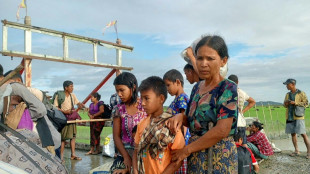 Desperate Myanmar villagers scavenge for food as hunger bites
Desperate Myanmar villagers scavenge for food as hunger bites
-
Qualifier Atmane stuns Rune to set up Sinner semi-final in Cincinnati

-
 Hong Kong tycoon Jimmy Lai's security trial delayed over health concerns
Hong Kong tycoon Jimmy Lai's security trial delayed over health concerns
-
Asia stocks mixed before US-Russia summit

-
 Putin hails North Korean troops as 'heroic' in letter to Kim
Putin hails North Korean troops as 'heroic' in letter to Kim
-
Fleeing the heat, tourists explore Rome at night, underground

-
 Online cockfighting thrives in Philippines despite ban and murders
Online cockfighting thrives in Philippines despite ban and murders
-
Keeping cool with colours -- Vienna museum paints asphalt to fight heat

-
 Raising the bar: Nepal's emerging cocktail culture
Raising the bar: Nepal's emerging cocktail culture
-
El Salvador plans 600 mass trials for suspected gang members

-
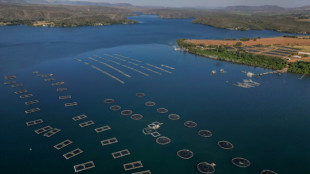 Trump's tariffs drown Brazil's fish industry
Trump's tariffs drown Brazil's fish industry
-
Hong Kong tycoon Jimmy Lai's collusion trial resumes after delay

-
 Britain's Princess Anne turns 75 with typically minimal fuss
Britain's Princess Anne turns 75 with typically minimal fuss
-
Japan posts modest growth despite US tariffs

-
 Rugby Championship kicks off amid uncertain future
Rugby Championship kicks off amid uncertain future
-
Israeli far-right minister backs contentious West Bank settlement plan
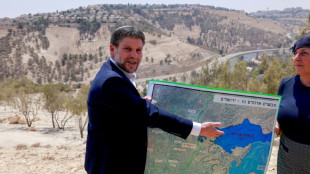
-
 Hot putter carries MacIntyre to three-shot lead at BMW Championship
Hot putter carries MacIntyre to three-shot lead at BMW Championship
-
'Ridiculous': How Washington residents view the new troops in town

-
 Global plastic pollution treaty talks extended in 'haze' of confusion
Global plastic pollution treaty talks extended in 'haze' of confusion
-
Trump's tariffs have not reduced Panama Canal traffic -- yet

-
 YouTube turns to AI to spot children posing as adults
YouTube turns to AI to spot children posing as adults
-
Sky's the limit for Duplantis ahead of 'super-sick' Tokyo worlds

-
 New clashes in Serbia as political crisis escalates
New clashes in Serbia as political crisis escalates
-
Sinner swamps Auger-Aliassime in Cincinnati power display

-
 Oil prices rise ahead of US-Russia summit as stocks digest inflation data
Oil prices rise ahead of US-Russia summit as stocks digest inflation data
-
California to change election maps to counter Texas, governor says

-
 Apple Watch gets revamped blood oxygen feature
Apple Watch gets revamped blood oxygen feature
-
Wales wing Rees-Zammit returns to rugby with Bristol after NFL dream ends

-
 Trump vows not to be intimidated ahead of Putin summit
Trump vows not to be intimidated ahead of Putin summit
-
Dueling interests for Trump and Putin at Alaska summit

-
 Global plastic pollution treaty talks in a 'haze'
Global plastic pollution treaty talks in a 'haze'
-
Bristol sign Wales wing Rees-Zammit after NFL dream ends

-
 Gauff cruises into Cincinnati quarter-final with Paolini
Gauff cruises into Cincinnati quarter-final with Paolini
-
Flood kills 56 in Indian Kashmir mountain village, scores missing
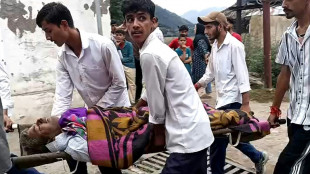
-
 Apple rejects Musk claim of App Store bias
Apple rejects Musk claim of App Store bias
-
Searchers seek missing after deadly Italy migrant shipwreck

-
 Air Canada cancels flights over strike threat
Air Canada cancels flights over strike threat
-
Trump turns history on head with Putin invitation to key US base

-
 Gauff dominates Bronzetti to reach Cincinnati last eight
Gauff dominates Bronzetti to reach Cincinnati last eight
-
UN warns Russia, Israel of conflict sex crimes listing risk

-
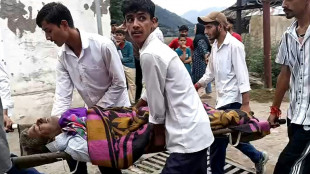 Flood kills 46 in Indian Kashmir mountain village
Flood kills 46 in Indian Kashmir mountain village
-
Germany sacks rail chief with train network in crisis


Three dead after cyclone batters Bangladesh and India
Residents of low-lying areas of Bangladesh and India surveyed the damage on Monday as an intense cyclone that lashed the coast weakened into a heavy storm after killing at least three people, damaging homes and uprooting trees.
Fierce gales and crashing waves battered the coast as Cyclone Remal made landfall on Sunday night, but by midday on Monday, the winds had eased.
"At least three people have died in the cyclone," Zahid Hossain Khan, a spokesman of the disaster management ministry, told AFP
Communications have been limited by the storm, with power lines ripped down.
Cyclones have killed hundreds of thousands of people in Bangladesh in recent decades, but the number of superstorms hitting its densely populated coast has increased sharply, from one a year to as many as three, due to the impact of climate change.
At its peak, Remal's wind speeds hit 111 kilometres (69 miles) per hour, said Muhammad Abul Kalam Mallik, senior weather forecaster at the state-run Bangladesh Meteorological Department.
"The cyclone has unleashed heavy rains in many parts of Bangladesh," Mallik told AFP, adding that it was weakening and turning into a storm.
An AFP reporter in the affected area said there had been heavy rain with extreme wind since Sunday evening, battering tall buildings, uprooting trees and tearing the tin roofs off homes.
While scientists say climate change is fuelling more storms, better forecasting and more effective evacuation planning have dramatically reduced the death toll.
Around a million people in Bangladesh and neighbouring India took shelter, fleeing inland for concrete storm shelters away from the dangerous waves.
Most of Bangladesh's coastal areas are just a metre or two (three to six feet) above sea level, and high storm surges can devastate villages.
Sumita Mondal, 36, who hunkered down overnight inland away from India's coast, said she had fled with only what she could carry.
"My three-year-old son is crying for food," she told AFP by telephone.
- 'Villages are flooded' -
Kamrul Hasan, secretary of the disaster management ministry, said there were no immediate reports of major damage, but said "embankments in several places have been breached or submerged, inundating some coastal areas".
In India's West Bengal, the "cyclone has blown off the roofs of hundreds of houses" and "uprooted thousands of mangrove trees and electricity poles", senior state government minister Bankim Chandra Hazra told AFP.
Electricity was off across large parts of the affected areas.
"Storm surges and rising sea levels have breached a number of embankments," Hazra added. "Some island villages are flooded."
At least 800,000 Bangladeshis fled their coastal villages, while more than 150,000 people in India also moved inland from the vast Sundarbans mangrove forest, where the Ganges, Brahmaputra and Meghna rivers meet the sea, government ministers and disaster officials said.
Mallik, the Bangladeshi weather expert, said the expansive mangrove forests helped dissipate the worst of the storm.
"Like in the past, the Sundarbans acted as a natural shield to the cyclone," he said.
But Abu Naser Mohsin Hossain, Bangladesh's senior forest official for the Sundarbans, said the storm surge had swamped crucial freshwater areas with salt water.
"We are worried," said Hossain. "These ponds were the source of fresh water for the entire wildlife in the mangroves -- including the endangered Bengal tigers."
Q.Jaber--SF-PST

